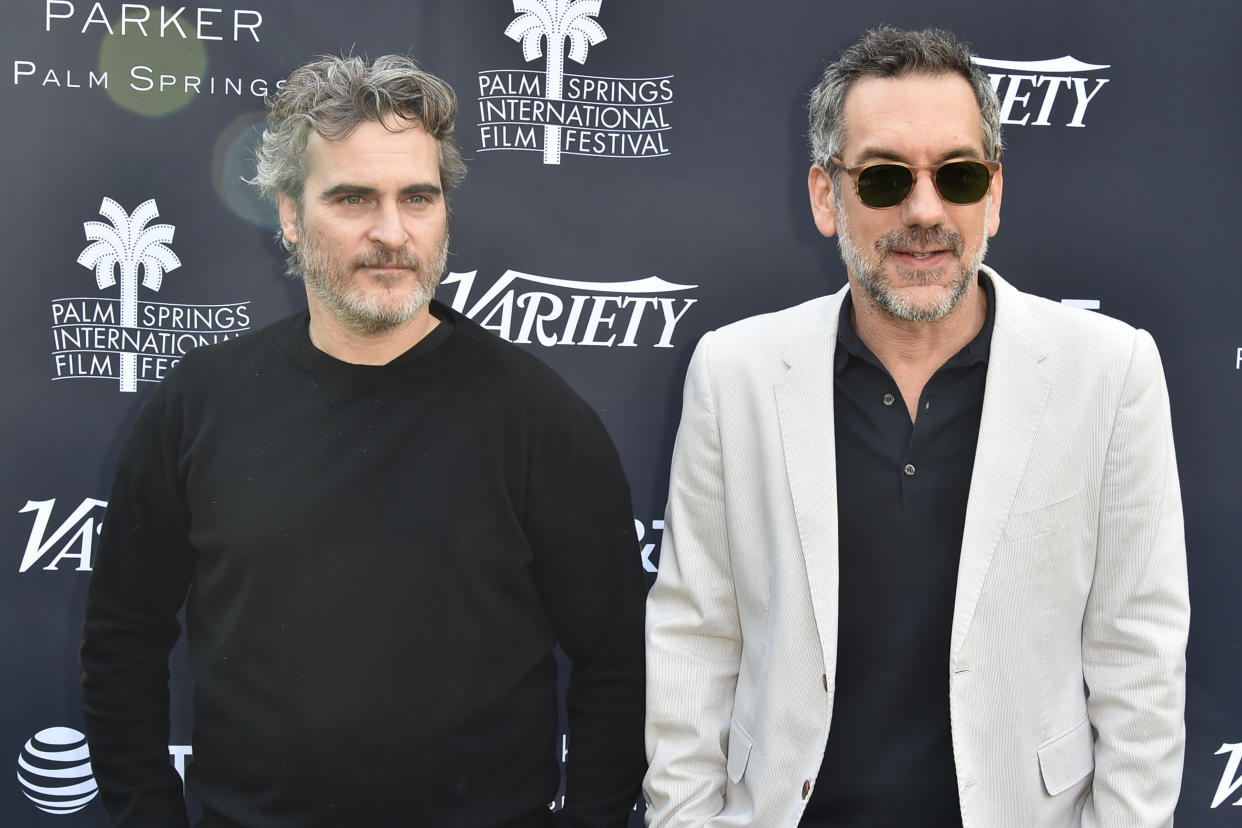Parents of Aurora shooting victim call out director Todd Phillips, Warner Bros. for dismissing 'Joker' violence

Despite Joaquin Phoenix and Todd Phillips's best efforts, the discussion surrounding the violence in Joker isn’t going away — and the parents of one of the victims of the Aurora mass shooting intend to keep it that way.
Sandy and Lonnie Phillips — no relation to Todd — penned an open letter to the Joker director Tuesday further explaining why they are "outraged" over the film. In 2012, their daughter Jessica was one of the 12 people murdered during a screening of The Dark Knight Rises.
"We are not outraged about The Joker because it has become a 'thing' to 'look for things to be outraged about,'" they begin, explaining they are "outraged" because their daughter "was murdered by an individual who was easily able to obtain firearms and ammunition in Aurora, Colorado. We are outraged because since her death, approximately 272,700 more Americans lost their lives in gun violence."
The letter was prompted by a recent interview Phillips did with Fresh Air's Terry Gross. When discussing negative reaction to the dark film, the director said, "We knew our intentions in making the movie. It kind of bummed us out that it was so divisive. But it does seem to be that we live in an age of outrage now and people look for things to be outraged about and they're going to be outraged just about that comment, probably. It's become a thing. The good news is the movie obviously struck a chord and people were having discussions about it and arguing about its merits."
Sandy and Lonnie Phillips also called out Warner Bros. in their letter.
"We are outraged because in the face of such carnage, Warner Bros. continues to profit from movies that depict fictional acts of gun violence while donating to lawmakers and candidates who make it easier for individuals to obtain firearms and commit acts of violence in the real world," they continue. "We are outraged at your flippant and dismissive remarks about our very real concerns and we are outraged that Warner Bros. has refused to meet with survivors of gun violence."
In September, the couple, along with other families of victims from the Aurora shooting signed a letter to Warner Bros. expressing concern about Joker and asking the studio to donate to gun-victim charities.
Sandy and Lonnie continue, "You told Terry Gross that you were happy to see The Joker inspiring 'discussions' and arguments about the 'real world implications of violence.' Well, we would love to discuss what steps the entertainment industry can take to keep its American audiences safe from gun violence and support victims of that violence in the real world. When are you and Warner Bros. available to engage in the very conversation you claim your movie is designed to spark?"
.@jokermovie director Philips said yesterday we’re outraged about Joker for the sake of it.
Wrong! We're outraged companies like @warnerbros profit from violent movies while failing to work to prevent actual gun violence
Work w/ us — together, we can save lives. pic.twitter.com/wQh8imAyJF— Sandy Phillips (@MamaRedfield) January 7, 2020
Warner Bros., which was also the studio behind The Dark Knight Rises, issued a response defending the film’s message last year when the first letter was circulated.
"Gun violence in our society is a critical issue, and we extend our deepest sympathy to all victims and families impacted by these tragedies. Our company has a long history of donating to victims of violence, including Aurora, and in recent weeks, our parent company joined other business leaders to call on policymakers to enact bipartisan legislation to address this epidemic. At the same time, Warner Bros. believes that one of the functions of storytelling is to provoke difficult conversations around complex issues. Make no mistake: neither the fictional character Joker, nor the film, is an endorsement of real-world violence of any kind. It is not the intention of the film, the filmmakers or the studio to hold this character up as a hero."
During the Fresh Air interview, Todd called the backlash "stressful," but said, "Luckily, most people saw it for what it is: a movie about childhood trauma, a movie about the lack of love in the world, a movie about the loss of empathy in society. Most people saw that for what it is."
He continued, "I can't tell you the amount of emails or messages I got on my Instagram of people talking about what a wonderful depiction of mental illness it is. You know, the thing that seemed to resonate most with people is when Arthur writes in his notebook, 'The worst part about having a mental illness is people expect you to behave as if you don't.' And that really spoke to people that have it.
"Because you're suffering, but you're not wearing a cast. You're suffering, but you're not in a wheelchair. So people think, what's wrong with you? You're fine," he added. "And I think that really connected and resonated with people in a meaningful way. So that kind of thing makes it worth it. Not that that erases everything else. But, you know, it connected with the people that it had to connect with."
The criticism hasn’t slowed Joker down this awards season as the film just received 11 BAFTA nominations.
Read more from Yahoo Entertainment:
Rose McGowan says 'even' Harvey Weinstein 'deserves a fair trial' as jury selection begins
Inside the Golden Globes 2020: 10 things you didn't see watching at home
Want daily pop culture news delivered to your inbox? Sign up here for Yahoo Entertainment & Lifestyle’s newsletter.

